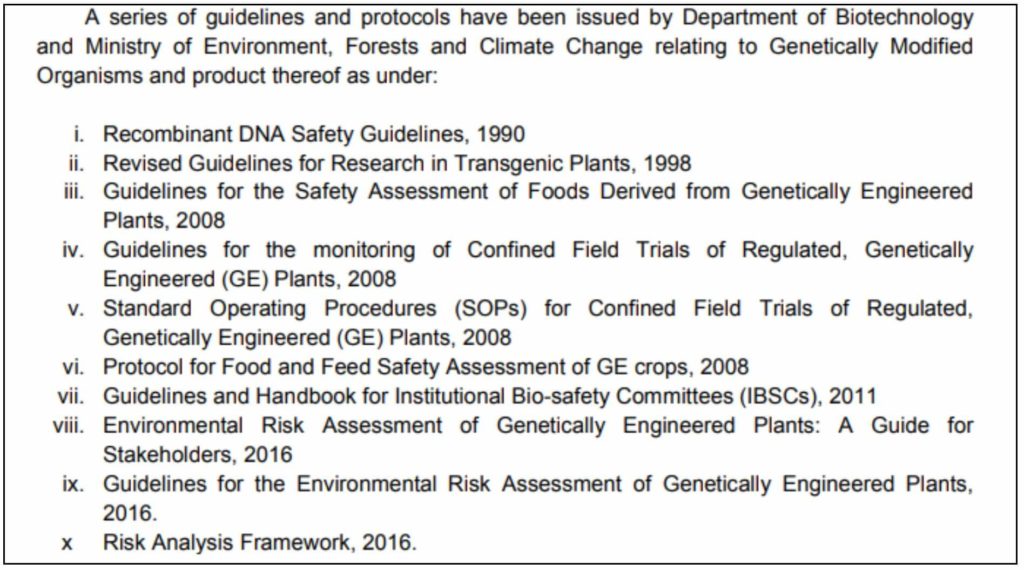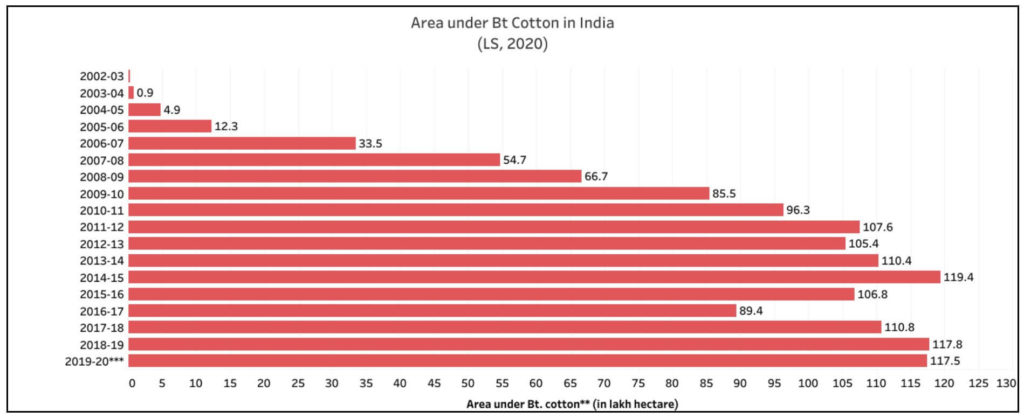There have been reports of farmers in Maharashtra protesting the central government’s de facto ban on GM crops barring Bt. Cotton. However, the issue of GM Crops has been a controversial one in India with vociferous argument both for and against the introduction.
Recently, the media reported that farmers in Maharashtra are protesting the central government’s move which bans the cultivation of genetically modified crops, or GM crops. Reportedly, the agitation is intensifying as days pass, paving the way for debates to resume on whether GM crops should be made legal. The topic on GM crops itself is a convoluted one.
What are GM crops?
Genetically Modified Organisms are defined as organisms including plants, animals, and micro-organisms in which the genetic material (DNA) is altered in a way that does not occur naturally by mating or natural recombination. The technology used is referred to as gene technology, genetic engineering, or recombinant DNA technology. GM crops are those crops whose DNA has been modified by introducing alien genes in the seeds to get desired effects such as resistance to pest attacks. Unlike what plant breeders did traditionally in cross breeding by combining genes from same or closely related plant species, GM technology does not restrict trait selection. Genes from any living organism, be it plants, or animals, is used to arrive at the desired traits.
The only approved GM Crop is Bt. Cotton
The only approved GM crop in India till date is Bt. Cotton. For developing resistance to Lepidoptera order of insects such as butterflies and moths, a gene from Bacillus thuringiensis var. kurstaki bacteria is introduced, which produces a protein insecticidal to Lepidoptera larvae, thereby aiding cotton production without excessive use of chemical insecticides. Likewise, there are GM varieties for crops like Maize, Soyabean, Brinjal, etc. around the world. However, different regulations exist in different parts of the globe for cultivation of GM crops. 172 countries, including India, have signed the Cartagena Protocol on Biosafety, an international agreement to ensure safe handling, transport and use of living modified organisms which are a result of modern biotechnology.
GEAC in India was set up to regulate & monitor GM crop production, and usage in the country
Genetic Engineering Appraisal Committee (GEAC) has been set up in India under the Ministry for Environment, Forest, and Climate Change. According to the 1986 rules on genetically engineered organisms, the main function of the statutory body is to regulate the use, manufacture, storage, import, and export of hazardous organisms, genetically engineered organisms and cells in India. Thus, GEAC must approve commercial production of GM crops in the country for any of them to be used. The approval is given on the basis of a regulatory framework under the rules.
Some of the guidelines and protocols issued by the Department of Biotechnology and MoEFCC with respect to GM organisms are listed below.

Cultivation of unapproved GM crops is a punishable offence
So far, GEAC approved the cultivation of only Bt. Cotton in 2002. This implies that the cultivation of GM versions of other crops is banned in the country. In spite of the ban, incidences of suspected open cultivation of Bt. Brinjal was reported in the states of Andhra Pradesh, Haryana, Maharashtra, and Punjab which is illegal. The Environment Protection Act, 1989 makes use of the unapproved GM crops a punishable offence attracting a penalty up to Rs. 1 Lakh and imprisonment for a term of five years. States have been asked to strengthen Biotechnology Coordination Committees and District Level Committees to monitor the illegal cultivation as well as take necessary action.
As per those who support the introduction of GM crops, depending on the variety of crop, farmers will benefit using GM seeds. Loss due to pest attacks can be averted. Further, use of chemical pesticides and herbicides can also be reduced. Production costs can therefore be reduced and increase production stability. The technology is also being used now to develop drought tolerant, nutrient and water efficient varieties which will help farmers more.
GM crops can have serious implications on the environment
However, not everything is as rosy as it looks. Proper research must be carried out to study all aspects of GM crops. The reason behind the elaborate approval process is to ensure that the GM crop does not affect the health of human beings, animals, and the environment. Since the species have been artificially created, if it breeds with wild relatives, the natural ecosystem can result in genetic contamination. An example is the pollination and fertilization of Bt. Corn crop with a non Bt. Corn. This will result in problems for the certified organic producers of corn. Another argument from ecologists is that the Bt. crops can harm non-target insects. In the case of Bt. Corn, Monarch butterflies feeding on wild milkweed that grows near cornfields may be harmed. Studies are still ongoing about the environmental effects of GM crops. Sustainability of the technology, consumer choice and labelling for monitoring are some other concerns with respect to GM crops in India.
Area under GM crops is on the rise globally
Globally, area under GM crops has increased manifold from 17 lakh hectares in 1996 to 1917 lakh hectares in 2018. Meanwhile, in India, the area under Bt. Cotton has increased from 0.29 lakh hectares in 2002-03 to 117.47 lakh hectares in 2019-20, according to Directorate of Economics and Statistics. The figure for 2019-20 is almost 94% total area under cotton cultivation in India. In other words, the area under Bt. Cotton cultivation has increased from less than 1% in 2002-03 to almost 94% in 2019-20. During the same period, the yield has also increased from 191 kg per hectare to 436 kg per hectare as per the data provided by the government.

On the other hand, approval for GM Brinjal and Mustard varieties is still under process. Concerns were raised by state governments, NGOs, public, and scientists because of which the environment ministry put a moratorium on the commercialization of Bt. brinjal in 2010.
Crop failure in cotton belt resulted in suicides and protests
Monsanto, an American agrochemical and agricultural biotechnology company supplied Bt. cotton seeds in India in early 2000s. Crop failure in the cotton belt area- Andhra Pradesh and Maharashtra, resulted in farmer suicides and widespread protests by farmers against the high price of seeds and low yield. Many studies by NGOs have also mentioned that the company destroyed farming in India. It has been accused of even monopolizing seeds, and collection of huge amounts in name of royalty.
Tough questions remain
It is true that the production & yield has increased since the introduction of Bt. Cotton. The same may happen in case of other crops as well. Though there is a ban on other GM crops, cases of cultivation of GM Crops not approved by the government indicate that there may be an illegal supply of GM seeds in the country. There are strong arguments for both for and against the introduction of GM crops in the country. Hence the government must take steps carefully keeping in the mind of interests of farmers, national biosafety and biosecurity.
Featured Image: GM Crops in India


